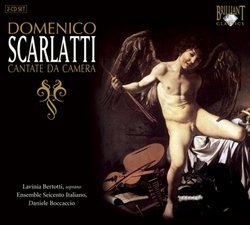| All Artists: Domenico Scarlatti, Daniele Boccaccio, Ensemble Seicento Italiano, Lavinia Bertotti Title: Domenico Scarlatti: Cantate da Camera Members Wishing: 0 Total Copies: 0 Label: Brilliant Classics Original Release Date: 1/1/2008 Re-Release Date: 2/5/2008 Genre: Classical Styles: Opera & Classical Vocal, Chamber Music, Historical Periods, Baroque (c.1600-1750), Classical (c.1770-1830) Number of Discs: 2 SwapaCD Credits: 2 UPCs: 842977033618, 5028421933610 |
Search - Domenico Scarlatti, Daniele Boccaccio, Ensemble Seicento Italiano :: Domenico Scarlatti: Cantate da Camera
 | Domenico Scarlatti, Daniele Boccaccio, Ensemble Seicento Italiano Domenico Scarlatti: Cantate da Camera Genre: Classical
|
Larger Image |
CD Details |
CD ReviewsWho Was That Masked Man? Giordano Bruno | Wherever I am, I am. | 06/07/2010 (5 out of 5 stars) "I can't claim to know much about the human being Domenico Scarlatti -- about his conduct or his mentality, that is -- but I'm not alone. Amazingly little is known about the man, other than his places of residence, except from mentions of him in the surviving correspondence of his friend, the singer Senesino. There are supposedly descendants of his still living in Madrid, and there is an amusing, eccentric portrayal of him in the Portuguese novel, Baltazar and Blimunda, by Jose Saramago. Thus I'm completely unjustified is supposing that he was 'one bizarre dude' even by the standards of musicians. I wonder if he wasn't clinically depressed for much of his life, or suffering from some syndrome that modern pharmacopeia could alleviate. Whatever his mental state, no one could deny that he was "functional" and productive. But herewith I have to risk offending my keyboardist friends by publicly wishing he'd devoted more of his 'genius' to other genres than his 355 sonatas for solo harpsichord.
That wish is generated by the magnificence of his far smaller repertoire of vocal and multi-instrumental music. The best of his works are his "Stabat mater a dieci voci" and "missa quatuor vocum", recorded superbly by Concerto Italiano under Rinaldo Alessandrini. That CD is rivaled closely by "Lettere amorose", an assortment of cantatas and sonatas recorded by Il Complesso Barocco under Alan Curtis. This CD of "Cantate da Camera" comes a close third. The eight cantatas all derive from a parchment manuscript now in Vienna but certainly prepared in Spain (based on the notational format) and likewise the music was almost certainly written in Spain for a Spanish patron, even though the language of the cantatas in Italian. The poetry, I'm sad to say, is not translated in the CD notes, but it's utterly typical ardent love-sickness stuff, expressed with dramatic plangency in the music. My guess is that it was composed for a very tasteful and competent amateur singer, since it carefully eschews the kinds of flamboyant gyrations demanded by professional vocal superstars of the era, most notably the haughty castrati. Compositionally, these sonatas clearly represent a moment of transition from baroque to 'classical' musical tastes and practices. The CD notes, though the songs are untranslated, do include an intelligent exposition of the musical forms and of how they diverge from their baroque models. Soprano Lavinia Bertotti has the perfect voice to match the acute, plangent timbres of the gut-strung 'period' violins, cello, and violone of Ensemble Seicento Italiano. Singer and instrumentalists are equally uncompromising in their expression of Scarlatti's chromatic intensity, the most distinctive quality of this music being its ear-tingling chromatic dissonances. Listeners accustomed to the buttered-up moderations of later instruments and tempered scales may need to adjust. All eight cantatas are distinctive in the prominence they give to instrumental passages, as well as to instrumental obbligatos during the arias. 'Basso' is supplied by theorbo and harpsichord, but it isn't the usual 'continuo' sort of basso, and that's another sign of the transitional quality of Domenico Scarlatti's music." |

 Track Listings (17) - Disc #1
Track Listings (17) - Disc #1